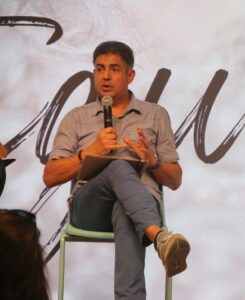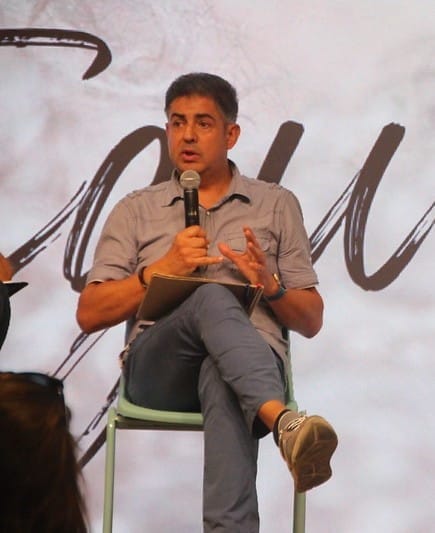 “Sheep farming is very important for society, but society is not aware of it: we need to continue making progress in improving productivity and sustainability, and we need to transmit and better value all the benefits it generates”. Roberto Ruiz is a researcher and Head of the Animal Production Department of Neiker-BRTA, Basque Institute for Agricultural Research and Development, and is currently the coordinator of the LIFE GREEN SHEEP project in Spain. His activity has been developed around R&D&I projects focused on sheep and cattle systems in the Basque Country, mainly related to their characterization, the analysis of the technical, environmental and social impact of livestock farming, the improvement of sustainability, the development of simulation-optimization models for decision support, and animal welfare in sheep.
“Sheep farming is very important for society, but society is not aware of it: we need to continue making progress in improving productivity and sustainability, and we need to transmit and better value all the benefits it generates”. Roberto Ruiz is a researcher and Head of the Animal Production Department of Neiker-BRTA, Basque Institute for Agricultural Research and Development, and is currently the coordinator of the LIFE GREEN SHEEP project in Spain. His activity has been developed around R&D&I projects focused on sheep and cattle systems in the Basque Country, mainly related to their characterization, the analysis of the technical, environmental and social impact of livestock farming, the improvement of sustainability, the development of simulation-optimization models for decision support, and animal welfare in sheep.
The situation of sheep farming in Spain
“During the last decades, a progressive and important decline in livestock censuses has been observed, although it is not so marked in the number of flocks. For example, the total number of sheep has gone from 22.7 million head (17 million breeding ewes) and 115,000 flocks in 2005 to 14.9 million head (11.5 million ewes) and 111,000 flocks in 2023. This means that around 35% of the flock has disappeared in this time, and the trend looks set to continue for the time being.
There are many factors contributing to this decline, both technical (lack of productivity in some cases), economic (rising feeding costs and low milk and meat prices), political (effect of CAP reforms), and to a large extent social (reduction in lamb meat consumption, loss of relevance and social attractiveness, conflict with wildlife, population displacement to urban areas and abandonment of the territory, etc.), so it is not easy to find solutions.
In this context, there is also a proliferation of messages about the contribution of livestock farming to greenhouse gas emissions, although it is more than proven that the real cause of climate change is related to the burning of fossil fuels. However, as with any other productive activity, there is a certain environmental impact in terms of greenhouse gas emissions related to the purchase of inputs, energy use, etc. and especially methane emissions derived from the ruminal fermentation of fibre, which is inevitable in ruminants, whose evolutionary advantage is precisely that they feed on resources (grass, shrubs, etc.) that are not suitable for direct consumption by humans. Although in reality the contribution of sheep farming to the national GHG emissions represents 16% of the total contribution of livestock farming.”
Why did you get involved in the LIFE Green Sheep project?
“At Neiker we have a long history of working on sheep farming in the Basque Country on different topics: genetic improvement, nutrition, reproduction, grazing management, welfare, animal health, etc. To this end, we usually liaise with other R&D centres and sectoral agents in the rest of Spain that work with other breeds and production systems, as well as in other countries, mainly in the European Union, including France. In fact, we have already been collaborating with IDELE in the framework of previous projects, such as Dairy4Future, SheepNet and Eurosheep.
In the context in which the sector finds itself, we believe that it is necessary on the one hand to assess the amount of emissions I mentioned earlier, and to propose measures to mitigate them. But above all, it is essential to arise the positive impacts that livestock farming linked to the territory has and from which the whole of society benefits (not only the people who consume sheep milk or meat, or who are directly related to the sector). In fact, for example, we know that pastoral systems have huge potential to fix large amounts of carbon and improve soil fertility and health through grazing, and thus play a key role in mitigating climate change, as well as keeping the land clean and preventing fires.
For all these reasons, we believe that efforts are needed to contribute to improving the sustainability of sheep farming in all its aspects: technical-economic, environmental and social. And to do this, it is advisable to make an initial assessment of the current situation in global terms of sustainability indicators, and from there to propose improvements, test them and disseminate them, in the hope that they will be applied by as many people as possible. So when we received the invitation from IDELE, and learned about the project’s approach, its conception with such a global focus, we didn’t hesitate and decided to join the proposal”.
Main challenges in taking this project forward
“Most people involved in the sheep sector tend to think of it as a sustainable activity in terms of its relationship with the environment. This is generally the case. However, it is necessary to confirm this impression with data to present to society, as well as to the people who make the activity possible in the flocks themselves and among the technical and veterinary advisory teams, etc. To do this, it is necessary to have people interested in receiving and sharing information and willing to commit themselves to the project (mainly livestock farmers, as well as the technical services of associations) at different levels. Reliable data on the management of a sample of flocks and production systems that is as representative as possible is needed to make an initial diagnosis of the situation. On the basis of the results obtained, there should be a willingness to reflect on the implications of the management carried out and to establish a constructive dialogue between farmers and technicians in order to consider the implementation of the changes in management practices that are considered most appropriate in each case. These innovations must be compatible with the conditions, objectives, preferences and quality of life of the people managing the flock, and be directed towards improving technical indicators, efficiency and productivity, and certainly also economic profitability and environmental sustainability. Because there is a lot of evidence that indicate that generally improved technical performance goes hand in hand with economic profitability and reduced greenhouse gas emissions”.
Short, medium and long term interest of the project for the sector
“As I have already mentioned above, we consider that the project should have a positive impact on the efficiency, productivity and competitiveness, as well as the sustainability of the participating flocks, and as a result reduce emissions and the negative environmental impact in terms of the carbon footprint of sheep milk and meat. From these flocks, I expect that there will then be a more widespread dissemination to a larger number of people and flocks (especially important through peer learning, e.g. among farmers themselves) of the most interesting management practices. At the same time, the project should also help to increase the awareness of the sectoral actors about the benefits and importance of these systems, and the empowerment of the people involved in sheep farming. In this way, we can continue to offer consumers, in sufficient quantity, the high quality foodstuffs that the sheep sector has always offered, and provide arguments to defend to society the importance and interest of its maintenance and sustainability. I think that the opportunity to prepare the sector for the implementation of the carbon markets that have been talked about lately is particularly relevant, as well as, hopefully, new scenarios that may arise to enhance the value of the services they generate (land management, fire prevention, etc.)”.
Let us hope so.

